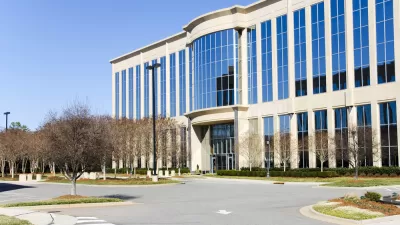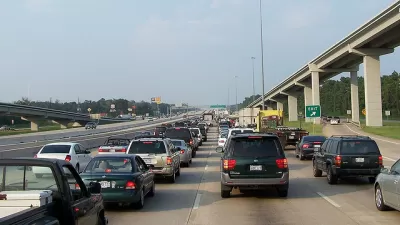In the United States, busy roads shorten lives in more ways than one, but when it comes to the ill effects of noise pollution, almost no efforts are made to reduce the damage.

"A team of Italian researchers found a broad consensus emerge from more than 250 scientific articles: urban noise pollution causes a variety of psychological, cardiovascular, and other health disorders — and the experts estimated that it costs 'at least one million healthy life years' per year across Western Europe," according to an article by Kea Wilson.
While the evidence in the new research doesn't include the American experience, but it's likely that the public health outcomes from noise are worse, because U.S. cities are even louder than European counterparts. "[I]t’s pretty clear we’re suffering too," writes Wilson, "only 65.5 percent of Europeans are routinely exposed to traffic noises above 50 decibels, but 97 percent of Americans live with that level of constant ruckus from our car-dominated road network."
The new study also provides ideas for future research, noting that most studies into the effects of noise pollution focus on air travel, despite the documented ill effects of noise pollution from automobiles.
"That dearth of research might help explain why restrictions on U.S. roadway sound levels are so lax. The Noise Control Act of 1972 authorized the Environmental Protection Agency to advise states on the recommended limits of noise pollution that would caused by their federally-funded road projects — but the responsibility for actually setting noise caps was shifted to the states less than ten years later, when the funding for the federal Office of Noise Abatement was rescinded," explains Wilson. Moreover: "The Federal Highway Administration provides almost no funding for highway noise abatement when it funds new road-building projects, besides a small number of federal dollars for concrete 'noise walls,' which don’t really work."
FULL STORY: The Other Type of Car Pollution That Harms Us All

Study: Maui’s Plan to Convert Vacation Rentals to Long-Term Housing Could Cause Nearly $1 Billion Economic Loss
The plan would reduce visitor accommodation by 25,% resulting in 1,900 jobs lost.

North Texas Transit Leaders Tout Benefits of TOD for Growing Region
At a summit focused on transit-oriented development, policymakers discussed how North Texas’ expanded light rail system can serve as a tool for economic growth.

Using Old Oil and Gas Wells for Green Energy Storage
Penn State researchers have found that repurposing abandoned oil and gas wells for geothermal-assisted compressed-air energy storage can boost efficiency, reduce environmental risks, and support clean energy and job transitions.

Opinion: DC Encampment Sweeps Hide, but Don’t Solve, Homelessness
President Trump recently ordered the clearing of encampments built by unhoused people on federal land in Washington, D.C.

Santa Barbara Could Build Housing on County Land
County supervisors moved forward a proposal to build workforce housing on two county-owned parcels.

San Mateo Formally Opposes Freeway Project
The city council will send a letter to Caltrans urging the agency to reconsider a plan to expand the 101 through the city of San Mateo.
Urban Design for Planners 1: Software Tools
This six-course series explores essential urban design concepts using open source software and equips planners with the tools they need to participate fully in the urban design process.
Planning for Universal Design
Learn the tools for implementing Universal Design in planning regulations.
Ascent Environmental
Borough of Carlisle
Institute for Housing and Urban Development Studies (IHS)
City of Grandview
Harvard GSD Executive Education
Toledo-Lucas County Plan Commissions
Salt Lake City
NYU Wagner Graduate School of Public Service





























